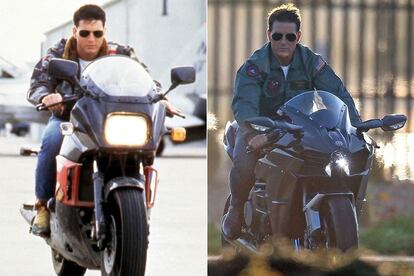Paramount studio wins copyright trial for ‘Top Gun’ sequel
The widow of the Israeli journalist whose article inspired the original hit film had sued the producers for alleged violation of intellectual rights


Paramount has emerged victorious from the court battle that was unleashed by Maverick’s return to the movie screens. A U.S. district judge dismissed a lawsuit filed by the widow of the Israeli journalist who wrote the article that inspired the 1986 film Top Gun. Ehud Yonay’s heirs claimed that the studio had violated intellectual property rights in making the sequel, Top Gun: Maverick, which became a global hit in 2022, grossing more than $1.5 billion at the box office. The judge ruled that many elements of the sequel, including the plot and the dialogues, had nothing to do with Top Gun. One of the few coincidences is that both had the U.S. Air Force pilot training school as their center of gravity.
Judge Percy Anderson stated in his decision that many of the elements claimed by the Yonay family in their lawsuit were not covered by copyright laws. The themes, dialogues, characters, setting, and selection and arrangement of the movie are not substantially similar to those presented in the article, according to a 14-page ruling reported on by The Hollywood Reporter.
Marc Toberoff, the lawyer who has represented the Yonay family since 2022, said in a statement that he will appeal the decision. Ehud’s estate sent a letter to Paramount in May of that year, weeks before the film’s release, warning that the release could violate copyright law because the rights to the story had returned to the family in January 2020.
The judge’s decision affirms that the rhythm and sequence of events in Top Gun: Maverick has little to do with the original film, released 36 years earlier, or with the original magazine article by Ehud Yonay, which explored life at the Miramar Naval Air Station in San Diego (California) in a non-linear way, making jumps in time and focusing on two pilots, Yogi and Possum. Instead, the most recent movie, directed by Joseph Kosinski, told a linear story that took place several years later and focused on a new crop of pilots at the North Island naval air station, also in San Diego.
The dismissal of the lawsuit clears the way for the third installment of the movie franchise starring Tom Cruise. The film is currently in pre-production at Paramount, with a script is by Ehren Kruger, who also penned the successful part two. Executives are in negotiations to get Kosinski back behind the camera, although the specialized media anticipates that production could get complicated if Paramount is acquired by SkyDance. The two entertainment giants are currently discussing the fate of one of Hollywood’s classic studios.
Whatever the case, Ehud Yonay’s name would not appear in the credits of the third movie. Judge Anderson has dismissed that possibility.
Sign up for our weekly newsletter to get more English-language news coverage from EL PAÍS USA Edition
Tu suscripción se está usando en otro dispositivo
¿Quieres añadir otro usuario a tu suscripción?
Si continúas leyendo en este dispositivo, no se podrá leer en el otro.
FlechaTu suscripción se está usando en otro dispositivo y solo puedes acceder a EL PAÍS desde un dispositivo a la vez.
Si quieres compartir tu cuenta, cambia tu suscripción a la modalidad Premium, así podrás añadir otro usuario. Cada uno accederá con su propia cuenta de email, lo que os permitirá personalizar vuestra experiencia en EL PAÍS.
¿Tienes una suscripción de empresa? Accede aquí para contratar más cuentas.
En el caso de no saber quién está usando tu cuenta, te recomendamos cambiar tu contraseña aquí.
Si decides continuar compartiendo tu cuenta, este mensaje se mostrará en tu dispositivo y en el de la otra persona que está usando tu cuenta de forma indefinida, afectando a tu experiencia de lectura. Puedes consultar aquí los términos y condiciones de la suscripción digital.








































